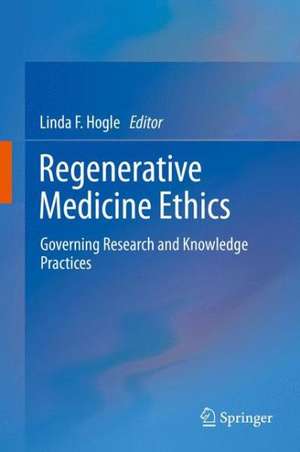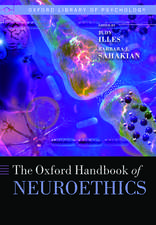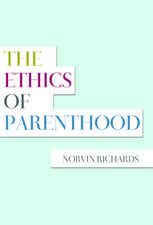Regenerative Medicine Ethics: Governing Research and Knowledge Practices
Editat de Linda F. Hogleen Limba Engleză Hardback – 20 noi 2013
While there is a superabundance of material on the ethics of embryo use and questions of embryonic "personhood," there is little that covers what practicing scientists and managers need to know in order to plan and execute responsible research. Furthermore, researchers funded by the NIH are required to have ethics training as a condition of the grant. As such, this book is an essential resource to all of these pre-professional students whether they plan to move into industry, government or academia.
| Toate formatele și edițiile | Preț | Express |
|---|---|---|
| Paperback (1) | 693.90 lei 6-8 săpt. | |
| Springer – 23 aug 2016 | 693.90 lei 6-8 săpt. | |
| Hardback (1) | 950.52 lei 6-8 săpt. | |
| Springer – 20 noi 2013 | 950.52 lei 6-8 săpt. |
Preț: 950.52 lei
Preț vechi: 1159.17 lei
-18% Nou
Puncte Express: 1426
Preț estimativ în valută:
181.90€ • 188.83$ • 151.68£
181.90€ • 188.83$ • 151.68£
Carte tipărită la comandă
Livrare economică 22 martie-05 aprilie
Preluare comenzi: 021 569.72.76
Specificații
ISBN-13: 9781461490616
ISBN-10: 1461490618
Pagini: 170
Ilustrații: VIII, 227 p. 2 illus. in color.
Dimensiuni: 155 x 235 x 17 mm
Greutate: 0.59 kg
Ediția:2014
Editura: Springer
Colecția Springer
Locul publicării:New York, NY, United States
ISBN-10: 1461490618
Pagini: 170
Ilustrații: VIII, 227 p. 2 illus. in color.
Dimensiuni: 155 x 235 x 17 mm
Greutate: 0.59 kg
Ediția:2014
Editura: Springer
Colecția Springer
Locul publicării:New York, NY, United States
Public țintă
Professional/practitionerCuprins
Part I: Foresight, hindsight and peripheral vision: Navigating contemporary legal, ethical and Policy issues in Regenerative Medicine.- Contemporary dilemmas facing regenerative medicine researchers: an overview.- Characterizing International Stem Cell Research Niches.- Policies and practices to enhance multi-sectorial collaborations and commercialization of regenerative medicine.- The Patenting Landscape for Human Embryonic Stem Cells.- Repositories for Sharing Human Data in Stem Cell Research.- PART II: Research Integrity: Updates for Regenerative Medicine Researchers.- Beyond the Checkboxes: Research Integrity for Regenerative Medicine Researchers.- Protecting Human Participants in the Procurement of Materials in Regenerative Medicine Research.- Early-Stage Research: Issues in Design and Ethics.
Recenzii
From the book reviews:
“The book will appeal to ethicists and college professors who are interested in research ethics and/or ethical, legal, and social implications (ELSI) projects. The book also will be useful to a variety of students interested in law and bioethics, or who are planning to conduct RMR. … this book provides many interesting insights into RMR, and those in the intended audience likely will find it to be useful, relevant, and thought provoking.” (Joseph T. Norris, Doody’s Book Reviews, September, 2014)
“The book will appeal to ethicists and college professors who are interested in research ethics and/or ethical, legal, and social implications (ELSI) projects. The book also will be useful to a variety of students interested in law and bioethics, or who are planning to conduct RMR. … this book provides many interesting insights into RMR, and those in the intended audience likely will find it to be useful, relevant, and thought provoking.” (Joseph T. Norris, Doody’s Book Reviews, September, 2014)
Notă biografică
Linda F. Hogle is Professor of Medical Social Sciences in the School of Medicine & Public Health at the University of Wisconsin-Madison and Fellow at the Wisconsin Institutes for Discovery. Her research includes analyses of social, ethical, and legal issues in emerging cell-based and biomedical engineering technologies, as well as concepts of risk in innovative science as understood by governance bodies. She has served as an advisor to several international research consortia focusing on stem cell and regenerative medicine.
Contributors include:
Sean P. Palecek, University of Wisconsin-Madison, Department of Chemical and Biological Engineering, WI
David Schaffer, University of California-Berkeley, Department of Chemical and Biomolecular Engineering, CA
Peter W. Zandstra, University of Toronto, Institute of Biomaterials and Biomedical Engineering, ON, Canada
David B. Resnik, National Institute of Environmental Health Sciences, NC
Tania Bubela, University of Alberta, Department of Public Health Sciences, AB, Canada
Amrita Mishra, University of Alberta, Department of Public Health Sciences, AB, Canada
Debra J. H. Mathews, The Johns Hopkins University, Berman Institute of Bioethics, MD
Kevin E. Noonan, McDonnell Boehnen Hulbert & Berghoff LLP, IL
Pilar N. Ossorio, University of Wisconsin-Madison Law School, WI
Jessica von Reyn, University of Wisconsin-Madison Law School, WI
Nancy M. P. King, Wake Forest University School of Medicine, Department of Social Sciences and Health Policy, NC
Amritava Das, University of Wisconsin-Madison, Department of Chemical and Biological Engineering, WI
Contributors include:
Sean P. Palecek, University of Wisconsin-Madison, Department of Chemical and Biological Engineering, WI
David Schaffer, University of California-Berkeley, Department of Chemical and Biomolecular Engineering, CA
Peter W. Zandstra, University of Toronto, Institute of Biomaterials and Biomedical Engineering, ON, Canada
David B. Resnik, National Institute of Environmental Health Sciences, NC
Tania Bubela, University of Alberta, Department of Public Health Sciences, AB, Canada
Amrita Mishra, University of Alberta, Department of Public Health Sciences, AB, Canada
Debra J. H. Mathews, The Johns Hopkins University, Berman Institute of Bioethics, MD
Kevin E. Noonan, McDonnell Boehnen Hulbert & Berghoff LLP, IL
Pilar N. Ossorio, University of Wisconsin-Madison Law School, WI
Jessica von Reyn, University of Wisconsin-Madison Law School, WI
Nancy M. P. King, Wake Forest University School of Medicine, Department of Social Sciences and Health Policy, NC
Amritava Das, University of Wisconsin-Madison, Department of Chemical and Biological Engineering, WI
Textul de pe ultima copertă
Regenerative medicine is at a pivotal point. Innovations in the science and the rapid growth of translational medicine are transforming the field just as institutional arrangements are changing, making this an exciting yet unsettled time. Recent court cases and policy initiatives are creating crosscurrents that keep older issues from being settled while introducing new dilemmas. Current research propels collaborations across disciplines and sectors, raising the question of how tensions between the protection of intellectual property and the movement toward ‘open science’ can be negotiated. Other important social, ethical and legal questions arise in the gray areas created by new scientific techniques and pragmatic areas involved in scale-up and testing in humans. The times call for governance that is adaptive to meet the needs of science yet able to maintain public trust.
The contributors address these and other vital questions through chapters focusing on topics such as data sharing; patenting of human biological material; and managing collaborations across academic, industry and government sectors as well as across national boundaries. Key research ethics issues are also included such as obtaining consent from biospecimen donors; accessing biorepository data, and considerations in designing preclinical and clinical trial protocols for first-in-human research, including upcoming policy changes.
Rather than retracing well-trodden topics, the book points to nascent areas that need to be addressed. Whether working in academia, industry, or government, regenerative medicine scientists and managers need to know how to navigate current and upcoming issues of governance facing the field. Regenerative Medicine Ethics:Governing Research and Knowledge Practices will be a valuable resource for scientists, policy-makers and students as they plan and execute responsible research.
About the Editor
Linda F. Hogle is Professor of Medical Social Sciences in the School of Medicine & Public Health at the University of Wisconsin-Madison and Fellow at the Wisconsin Institutes for Discovery. Her research includes analyses of social, ethical, and legal issues in emerging cell-based and biomedical engineering technologies, as well as concepts of risk in innovative science as understood by governance bodies. She has served as an advisor to several international research consortia focusing on stem cell and regenerative medicine.
The contributors address these and other vital questions through chapters focusing on topics such as data sharing; patenting of human biological material; and managing collaborations across academic, industry and government sectors as well as across national boundaries. Key research ethics issues are also included such as obtaining consent from biospecimen donors; accessing biorepository data, and considerations in designing preclinical and clinical trial protocols for first-in-human research, including upcoming policy changes.
Rather than retracing well-trodden topics, the book points to nascent areas that need to be addressed. Whether working in academia, industry, or government, regenerative medicine scientists and managers need to know how to navigate current and upcoming issues of governance facing the field. Regenerative Medicine Ethics:Governing Research and Knowledge Practices will be a valuable resource for scientists, policy-makers and students as they plan and execute responsible research.
About the Editor
Linda F. Hogle is Professor of Medical Social Sciences in the School of Medicine & Public Health at the University of Wisconsin-Madison and Fellow at the Wisconsin Institutes for Discovery. Her research includes analyses of social, ethical, and legal issues in emerging cell-based and biomedical engineering technologies, as well as concepts of risk in innovative science as understood by governance bodies. She has served as an advisor to several international research consortia focusing on stem cell and regenerative medicine.
Caracteristici
Contextualizes ethics, policy and politics of stem cells to explain past and current issues and their implications for stem cell research going forward Addresses emerging issues as the field progresses towards clinical and industrial uses Covers what practicing scientists and managers need to know in order to plan and execute responsible research Includes supplementary material: sn.pub/extras


















